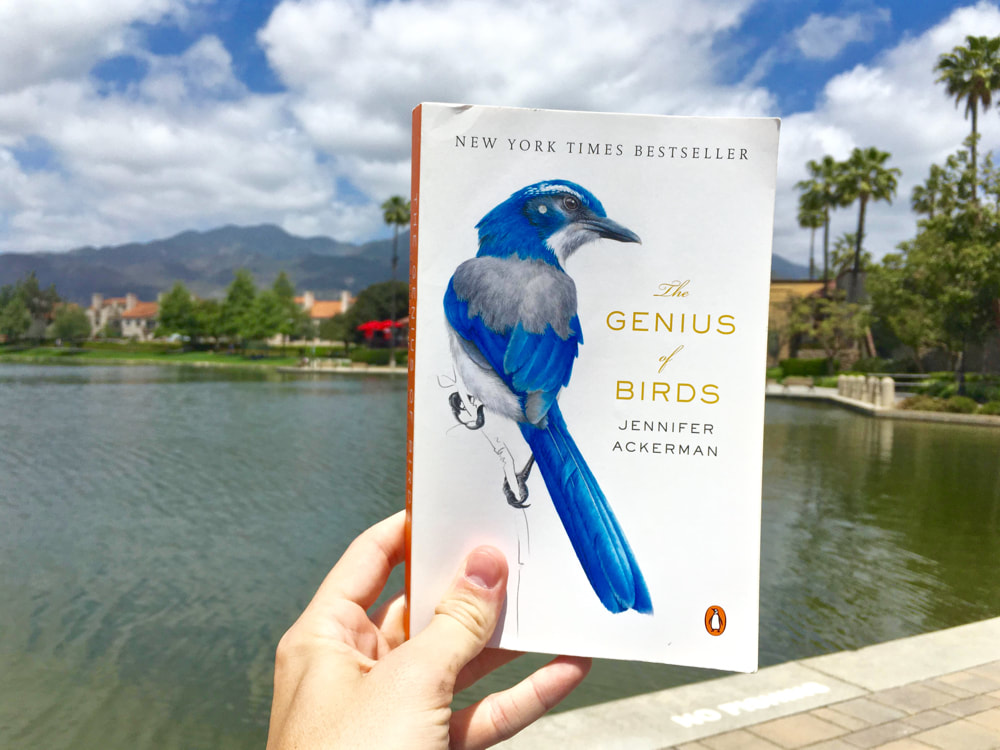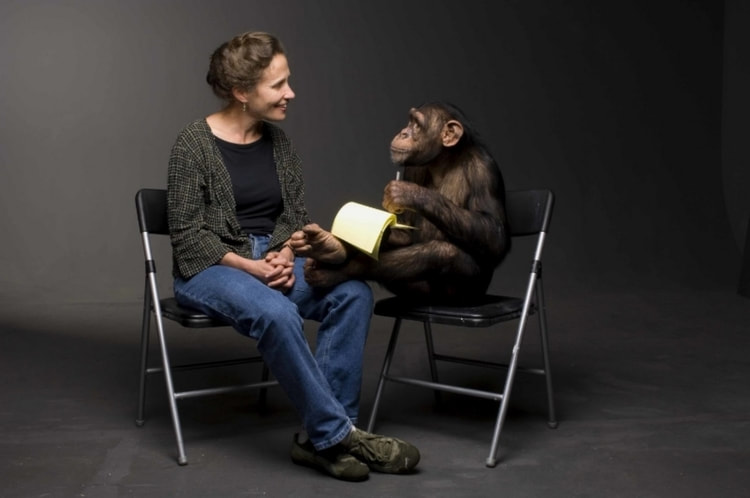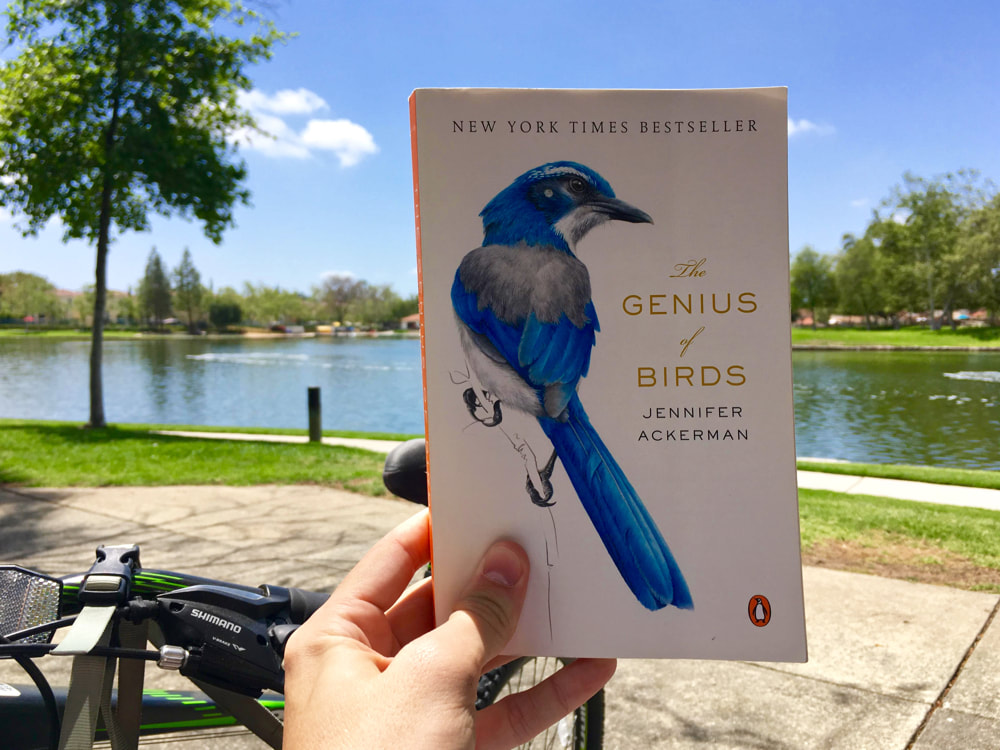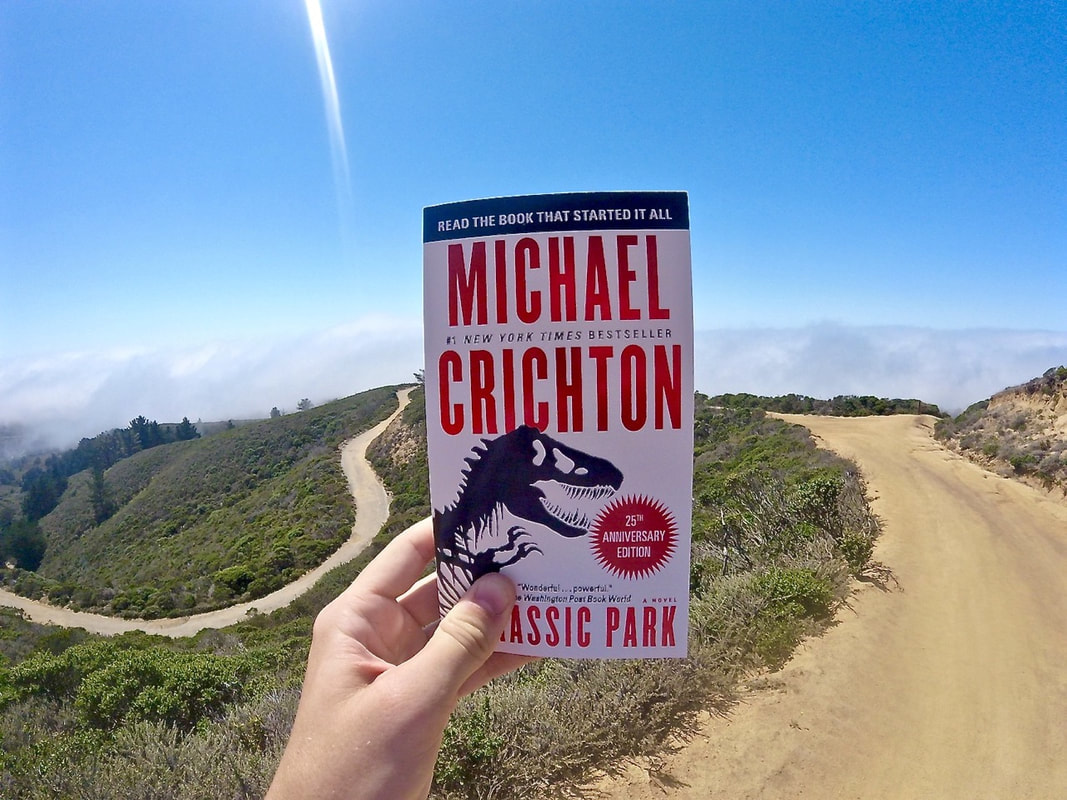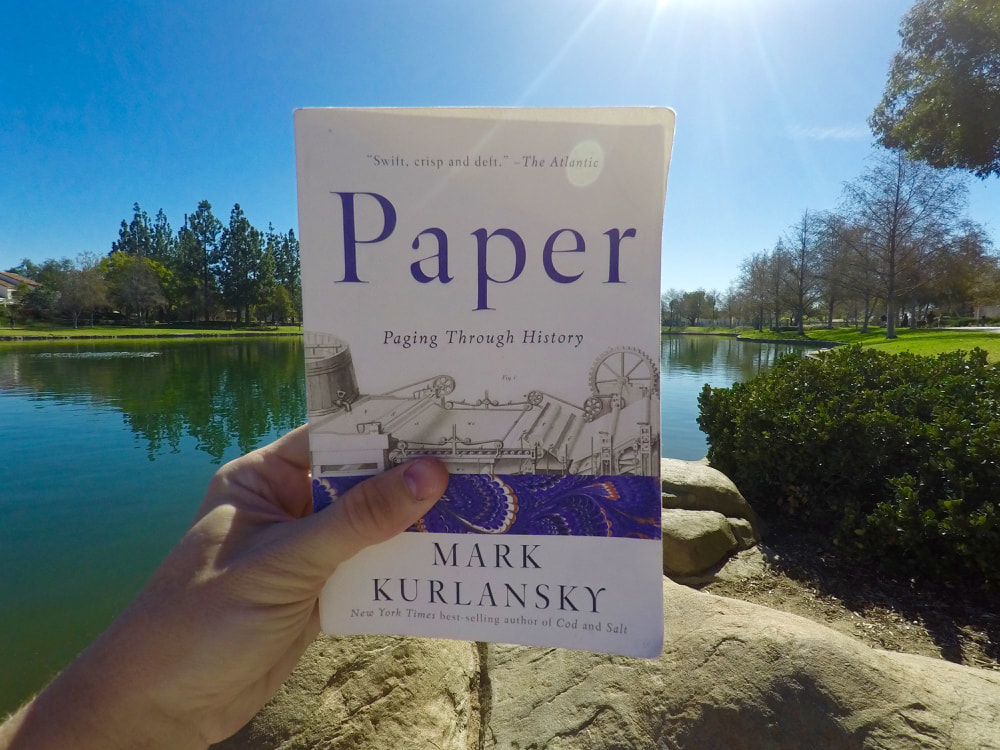| "Close to half the birds on the planet are songbirds, some four thousand species, with songs ranging from the mumbled melancholy chortle of the bluebird to the forty-note aria of the cowbird, the long Byzantine song of the sedge warbler, the flutelike tune of the hermit thrush, and the amazing seamless duets of the male and female plain-tailed wren." - Jennifer Ackerman, The Genius of Birds * * * |
| There are 400 billion birds on earth. That's 80 per human. And yet, for as resourceful and resilient as the feathered species are, author and "bird nerd" Jennifer Ackerman contends we still know very little about—and worse, largely dismiss—them. "Our language reflects our disrespect. Something worthless or unappealing is 'for the birds.' An ineffectual politician is a 'lame duck.' To 'lay an egg' is to flub a performance. To be 'henpecked' is to be harassed with persistent nagging. 'Eating crow' is eating humble pie. The expression 'bird brain,' for a stupid, foolish, or scatterbrained person, entered the English language in the early 1920's because people thought of birds as mere flying, pecking automatons, with brains so small they had no capacity for thought at all. That view is a gone goose." Birds are smart. Very smart. They make tools. They count. They imitate behaviors of other birds and even humans. They invent new solutions to old problems. They remember where they put things—especially the Western scrub jay which can recall up to 33,000 winter food caches. They can anticipate and guard against storms. They exploit opportunities, like the great tits and blue tits of the 1920's who learned how to open cardboard bottle tops to drink the cream off the top of milk bottles, and spread their knowledge over the next twenty years to hundreds of localities throughout England, Wales, and Ireland. Birds make nests up to idiosyncratic esthetic standards, even in the absence of females and the chance of mating. The allegedly 'bird-brained' pigeon has an incredible homing instinct and ability to traverse foreign landscapes...These incredible feats and others suggest profound mental capacities and abilities, ones comparable to those found in some primates. Intelligence, or genius, though, can be tricky concepts to pin down; there are plenty of definitions and approaches to measuring smarts, even within species, let alone finding some common ground from which to judge animals against one another. Ackerman lays out these conversations and debates early on—a contentious dialogue that includes some major players weighing in throughout history: names like Aristotle, Charles Darwin, and primatologist Frans de Waal. The central issue is: Are we merely anthropomorphizing, that is, ascribing uniquely human characteristics to the non-human? Or, are the critics of bird intelligence simply in what de Waal coined as "anthropodenial," attempting to build a conceptual brick wall to segregate humans from the rest of the animal kingdom? Weighing it at a featherlight 250 pages, The Genius of Birds is rich with eight uniquely self-contained chapters, that explore this central issue, and offers a banquet of anecdotal observations, neurological studies, fascinating experiment results, and a trove of open questions. We traverse the skies, woods, seas, islands, cities — and hear tidings from the perhaps "extraordinary genius packed tightly into that tiny puff of feathers" that, if we're listening, might "lay the mind wide open to the mysteries of a bird's knowing — the what and the why. These are wonderful puzzles to keep on our bookshelf, to remind us how little we still know." I'm reminded often while reading this book of a short passage from Mark Kurlanksy's, Paper, about how "the story of [a mythic hero of China] Cangjie learn[ed] writing from animal tracks," and how the myth "parallels a Sumerian story that tells of birds that were scribes and therefore sacred; their tracks resembled cuneiform, but were a type of cuneiform that humans could not read." I finished The Genius of Birds sitting on a bench overlooking Lake Rancho Santa Margarita at sunset. A Canadian goose honks from the distant bank at a man, until joined by what might be its mate. And across the water, closer to me, a chorus of bold sparrows sing atop a pair of swaying palm trees and the adobe roof slats of the local Starbucks. I will never look at or listen to a bird the same way again. [JG] |
ABOUT THE AUTHOR
| Jennifer Ackerman has been writing about science, nature, and human biology for almost thirty years. Her work has been featured in National Geographic, Scientific American, The New York Times, and other places. After perusing the titles of some of Jennifer's other books, I'll be picking up Sex Sleep Eat Drink Dream: A Day in the Life of Your Body and report back! * Website * |
QUOTES
| 10. "Intelligence is a slippery concept, even in our own species, tricky to define and tricky to measure. One psychologist describes it as "the capacity to learn or to profit by experience." And another is the capacity to acquire capacity." - the same sort of circular definition offered by Harvard psychologist Edwin Boring: "Intelligence is what is measured by intelligence tests." (8) 9. "The fog is lifting. I can begin to make out the undulant curtain of the Blue Ridge Mountains across the valley, purpled by the haze. From a grove of trees nearby comes the piercing zeet of a chickadee. I wander over, and there is the bird perched in a pine tree, rolling out its string of dees, perhaps taking measure of my presence. One has only to consider the extraordinary genius packed tightly into that tiny puff of feathers to lay the mind wide open to the mysteries of a bird's knowing — the what and the why. These are wonderful puzzles to keep on our bookshelf, to remind us how little we still know." (266) 8. "Cities have been called learning machines. They make make smart birds even smarter. Who can't cope in the urban jungle? Those birds distinctly unsparrow-like, skittish, or set in their ways. The bird startled off the nest by human hustle or bustle or thrown for a loop by round-the-clock lighting. The small-brained, the inflexible, the specialist." (253) 7. "In some cities, you can find smoked cigarette butts in sparrow nests, which effectively function as a parasite repellent. Butts from smoked cigarettes retain large amounts of nicotine and other toxic substances, including traces of pesticides that repel all kinds of creepy crawlies—an ap"parently ingenious new use of materials." (245) 6. "To survive the harsh winters [of Wstern North America], a single nutcracker will gather more than 30,000 pine seeds in a single summer, carrying up to one hundred seeds at a time in a special large pouch under its tongue. These it buries in up to 5,000 different caches scattered throughout a territory of dozens, even hundreds, of square miles. Then later it finds the scattered treasures...They rely almost completely on memory to locate their personal caches—and they can remember them for as long as nine months, despite radical changes in the appearances of the landscape across the season caused by snow, leaves, or shifting rock and soil." (211) 5. "The primeval rainforest that once blanketed New Caledonia has been reduced to pockets. But the island remains a diversity hotspot, with insect species thought to number upward of 20,000, including more than 70 native species of butterflies and 300-plus species of moths. There are some 3,200 species of plants on the island, three quarters of which are endemic, found nowhere else. For this reason, New Caledonia is often considered its own distinct floristic subkingdom. It is also an ark of colossal creatures...Strange things happen on islands. Gigantism is not uncommon. Nor is dwarfism or gaudy experiment or anomalies of every kind...Islands are castles of experiment surrounded by moats. Competition is less fierce and predators less abundant than on continents, so evolutionary experimentation is not so quickly or ruthlessly punished. That includes behavioral experimentation, like tooling around with tools. (perhaps it's not surprising that the only other birds on the planet to regularly potter with tools are the woodpecker finches of Galapagos.)" (75-6) 4. "Reciprocity in the form of gift giving is another kind of social behavior unusual in nonhumans but fairly common among certain birds, including crows. Two decades ago when a family friend first reported receiving gifts from the crows she regularly fed—a marble, a little wooden bear, a bottle cap, colored berries, all left on her doorstep—I was skeptical. But in recent years, tales have rolled in from all over the country of crows offering up gifts of jewelry, hardware, shards of glass, a Santa figurine, a foam dart from a toy gun, a Donald Duck Pez dispenser, even a candy heart with 'Love' printed on it, delivered just after Valentines's Day." (105) 3. "As early as 350 B.C., Aristotle noted that songbirds do not utter the same voice as their parents when they sing, if they are reared away from home and hear other birds singing." Darwin remarked on it, too. He knew that birds had an instinct to sing just as we have an instinct to speak, btu they learn the songs themselves, just as we learn languages. He suspected that birds, like people, pass alongn their songs from generation to generation, forming regional dialects." (149) 2. "In birds like the mockingbird, canary, and cockatoo, the gates of learning stay open for longer, so they can continue to add new songs as they grew older. But learning is harder for adults than for juveniles. We human, too, are "open-ended learners." And like mockingbirds and canaries, for us the task of language learning grows more arduous as we age." (154) 1. "Extravagance in nature is so often found in proximity to sex." (161) |
"Each spring, the robins nesting in our cherry tree attack the side mirror of our car as if it were a rival pecking furiously at their own reflections while streaking the door with guano. But who amongst us hasn't been toppled by our own vanity or made an enemy of our own image?"
- Jennifer Ackerman, The Genius of Birds
YOU MAY ALSO LIKE
| SAVE OUR SOULS An Interview with artist and psychologist Cyril Rolando | SALT A World History |
| Jon Glatfelter | Mark Kurlansky |
| JURASSIC PARK 'Life finds a way' + birds | PAPER Paging Through History |
| Michael Crichton | Mark Kurlansky |

